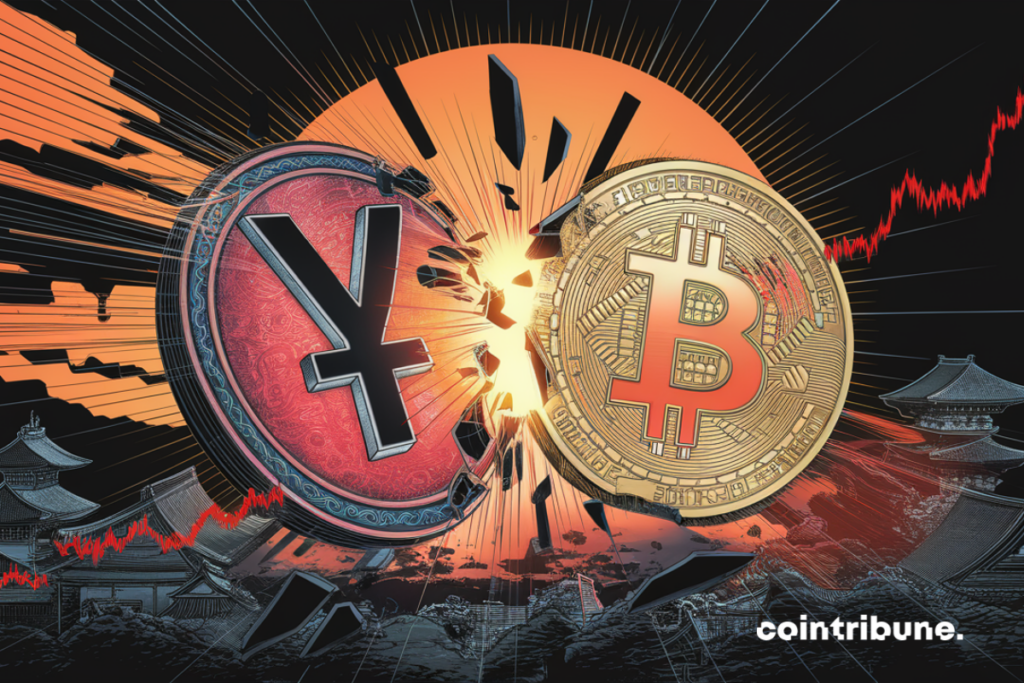The Japanese Yen looks absolutely tragic right here.
— Cory Klippsten | Swan.com 🦢 #Bitcoin (@coryklippsten) April 29, 2024
Might want to sell Yen for Bitcoin, just in case it catches on.#BTCJPY pic.twitter.com/daU20v8Rpy
A
A
The Yen collapses against Bitcoin
Mon 29 Apr 2024 ▪
5
min read ▪ by
Getting informed
▪
The yen collapses against bitcoin which appreciates by more than 150% over the past year. The Bank of Japan would do well to get rid of US debt.

The JPY at its lowest in over forty years
We are now at 160 yen to a dollar. The yen is at its lowest since 1990, down more than 30% since December 2021. The drop is even 50% since 2012, when a dollar was worth 77 yen.
The cause is the rise in inflation in the United States, which distances the lowering of the Fed’s interest rates. The dollar is now appreciating since the reduction in rates is no longer certain.
Moreover, Japan is an island with few natural resources. More than 93% of energy and 60% of foodstuffs must be imported.
“Japan is totally dependent on oil imports [97%], so the rise in the price per barrel translates into a weakening of the yen”, states Tsutomu Soma, Forex manager at Monex Tokyo.
“The situation in the Middle East is stoking fears of a new surge in oil prices, which would prompt the Fed to raise its interest rates again”, says Philip Wee, Forex manager at DBS Bank in Singapore.
Unfortunately for the Japanese, it is unlikely that the BoJ will raise interest rates to give the yen some breathing space. The country’s public debt is too high (260% of GDP). The government cannot afford to pay interest.
The interest rate gap with the United States will therefore remain, preventing the yen from appreciating against the dollar in return. This means that inflation in Japan will worsen. Unless saved in bitcoin:
Sell US debt to stay afloat?
Japan is the largest foreign holder of US Treasury bonds. The United States owes them $1,167 billion. That’s far more than China with its $775 billion.
Tokyo could easily strengthen the yen by shedding some of its dollar reserves. But that would be seen as a betrayal by Uncle Sam, who offers its protection against Japan’s historic rival, China.
As Michael Saylor says, “even if it is unspoken, the US nuclear arsenal comes into play when nations buy Treasury bonds”.
All that being said, the Wall Street Journal reports that the Bank of Japan (BoJ) intervened this Monday to stem the fall. It has undoubtedly sold some US Treasury bonds.
Today, 57% of global foreign exchange reserves ($7,965 billion) are invested in US debt. And if the BRICS are increasingly shunning it, the US allies (vassals) have no other choice but to pay up.
We will see for how long the Japanese agree to suffer so much inflation. In the meantime, the fall in the yen makes exports more competitive, which could help Japan regain its position in electronics.
The world’s third-largest economy once produced more than half of the electronic chips sold worldwide (Toshiba, Nintendo, etc.), versus only 10% today. Its declared goal is to increase its semiconductor exports to more than $108 billion by 2030, thus tripling the 2020 figure.
In short, Japan is betting on technological excellence and seems ready to sacrifice the purchasing power of the Japanese to achieve it. But there is a snag…
Bitcoin vs Dollar
The problem for Japan is that by financing the US debt, it is also financing a serious contender. The United States also intends to become a heavyweight in semiconductors again.
Their market share has gone from 37% to 12% over the last thirty years. In contrast, China now accounts for 18% of the global supply. Its semiconductors are not the latest generation yet, but the technological gap is closing rapidly.
Thus, the US Congress passed the Chips and Science Act in 2022 to catch up. The Act allocates a $53 billion budget to the Department of Commerce to revitalize America’s position in semiconductor research and manufacturing.
Japan is therefore committing hara-kiri by financing a direct competitor in the technological race. It will always be very difficult to compete with the Americans as long as they benefit from this exorbitant privilege.
That’s why nations would be better off keeping their foreign exchange reserves in bitcoin rather than in US Treasury bonds.
Japanese savers who followed this strategy do not regret it. Bitcoin is up 1150% against the yen over the last five years…
Maximize your Cointribune experience with our "Read to Earn" program! For every article you read, earn points and access exclusive rewards. Sign up now and start earning benefits.
A
A
Bitcoin, geopolitical, economic and energy journalist.
DISCLAIMER
The views, thoughts, and opinions expressed in this article belong solely to the author, and should not be taken as investment advice. Do your own research before taking any investment decisions.